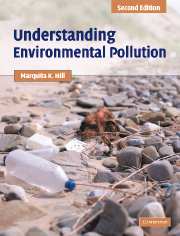Book contents
- Frontmatter
- Contents
- Preface
- Acknowledgements
- List of abbreviations and acronyms
- Chapter 1 Understanding pollution
- Chapter 2 Reducing pollution
- Chapter 3 Chemical toxicity
- Chapter 4 Chemical exposures and risk assessment
- Chapter 5 Air pollution
- Chapter 6 Acidic deposition
- Chapter 7 Global climate change
- Chapter 8 Stratospheric-ozone depletion
- Chapter 9 Water pollution
- Chapter 10 Drinking-water pollution
- Chapter 11 Solid waste
- Chapter 12 Hazardous waste
- Chapter 13 Energy
- Chapter 14 Persistent, bioaccumulative, and toxic
- Chapter 15 Metals
- Chapter 16 Pesticides
- Chapter 17 Pollution at home
- Chapter 18 Zero waste, zero emissions
- Index
- References
Chapter 11 - Solid waste
- Frontmatter
- Contents
- Preface
- Acknowledgements
- List of abbreviations and acronyms
- Chapter 1 Understanding pollution
- Chapter 2 Reducing pollution
- Chapter 3 Chemical toxicity
- Chapter 4 Chemical exposures and risk assessment
- Chapter 5 Air pollution
- Chapter 6 Acidic deposition
- Chapter 7 Global climate change
- Chapter 8 Stratospheric-ozone depletion
- Chapter 9 Water pollution
- Chapter 10 Drinking-water pollution
- Chapter 11 Solid waste
- Chapter 12 Hazardous waste
- Chapter 13 Energy
- Chapter 14 Persistent, bioaccumulative, and toxic
- Chapter 15 Metals
- Chapter 16 Pesticides
- Chapter 17 Pollution at home
- Chapter 18 Zero waste, zero emissions
- Index
- References
Summary
“The air and water grow heavier with the debris of our spectacular civilization.”
Former US President, Lyndon B. JohnsonMunicipal solid waste (MSW) is but one of many wastes. There are also construction and demolition debris, municipal sludge, combustion ash, mining and drilling debris, agricultural wastes, industrial-process wastes including some sludge, hazardous waste, and others. Altogether the United States alone produces about 10.1 billion tons (9.2 billion tonnes) of waste each year. MSW is barely 3% of that gigantic stream, but it is important: each of us is intimately associated with it. Its composition and amount is the result of our behavior. Moreover, if we move back one step, the businesses producing the products going into MSW generate much of those billions of pounds of waste. In Section I we ask why we generate so much waste. We examine municipal solid waste, what is in it, and why it is of concern. Section II looks at setting priorities in how we manage waste – the waste-management hierarchy (WMH). Pollution prevention is at the top of the WMH, but this section also examines reuse and recycling, incineration, and landfilling. Section III moves onto international MSW issues starting with wealthy societies, and examines the major problems that wastes pose in developing and impoverished societies. It ends with the example presented by the city of Curitiba, Brazil.
Information
- Type
- Chapter
- Information
- Understanding Environmental PollutionA Primer, pp. 253 - 281Publisher: Cambridge University PressPrint publication year: 2004
